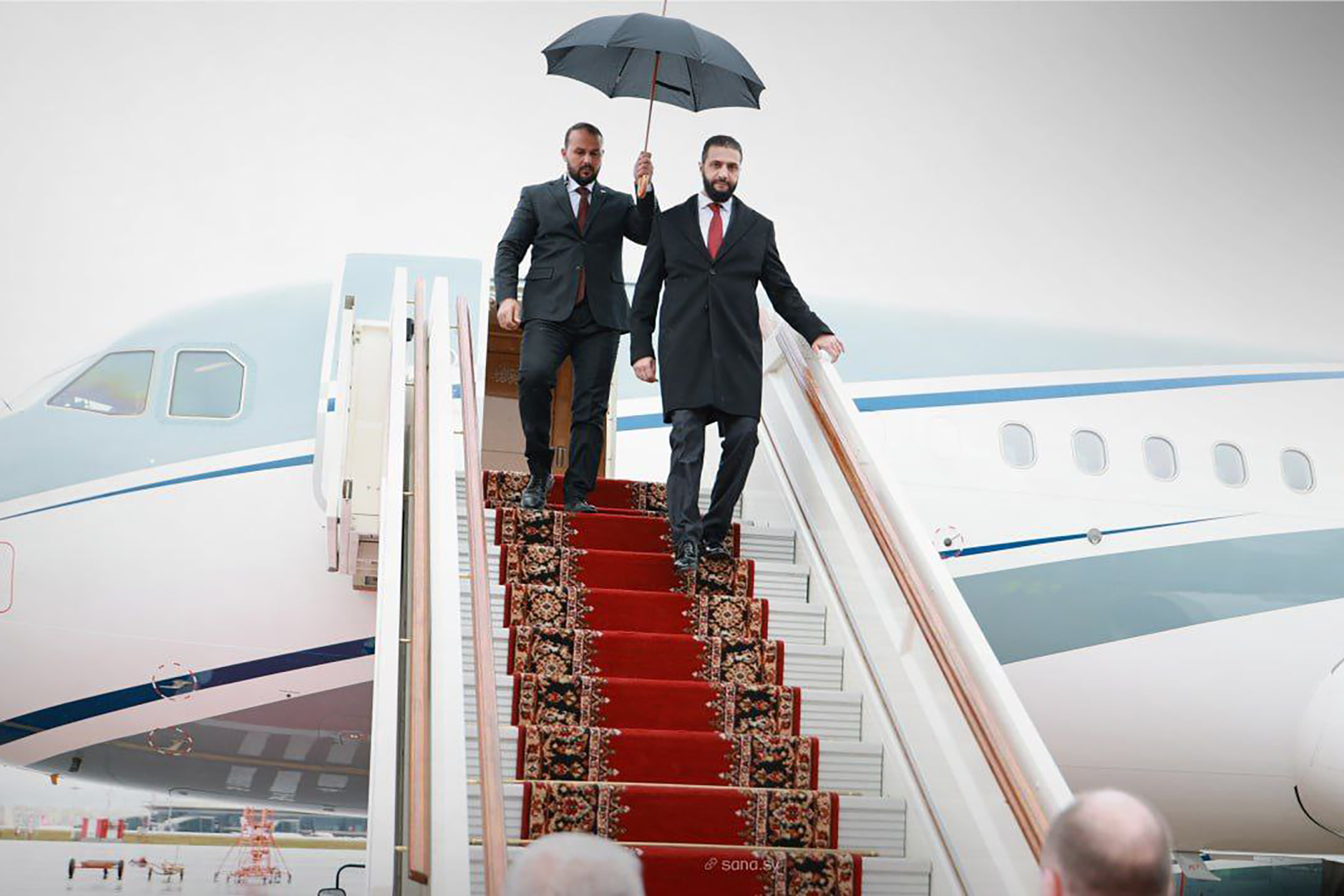Published On 15/10/2025
|
Last update: 22:32 (Mecca time)
In his first visit after the overthrow of former Kremlin ally Bashar al-Assad, Syrian President Ahmed al-Sharaa arrived in the Russian capital, Moscow, at the head of a high-ranking delegation, in a visit that analysts say aims to create a kind of balance in relations between Damascus and major countries.
Russia was a major supporter of Bashar al-Assad and is accused of killing tens of thousands of Syrians over the years of the revolution, which Moscow played a pivotal role in attempts to abort.
But President Vladimir Putin said in front of the cameras that his country’s relationship with the Syrian people is “very deep,” while Al-Sharaa said that he is trying to redefine this relationship in a new way that guarantees Syria’s safety, unity, and independence.
According to what has been circulated, the visit will discuss the fate of the Russian bases located in Hmeimim and Latakia in Syria. The French news agency also quoted an official source that Al-Sharaa will ask Putin to hand over all those involved in war crimes in Russia, led by Bashar al-Assad.
The visit represents an important development in terms of building new Syrian relations, which are dominated by the new regime’s desire to create a balance between the conflicting forces, analysts say.
Positive indicator
Director General of the Russian Council for International Affairs, Ivan Timofeev, confirmed that the visit gives a positive indication of the two countries’ desire to restore relations in a way that achieves their economic and security interests.
During his participation in the “Beyond the News” program, Timofeev said that the visit confirms that the political change that Syria has witnessed will not hinder the rebuilding and development of these relations, especially since Russia can offer a lot in the issue of rebuilding Syria.
The motives for Al-Sharaa’s visit to Moscow seem clear, in the opinion of political analyst Moayad Ghazlan Qiblawi, who believes that Damascus needs to strike a balance in its international relations so that it can confront the ongoing Israeli violations, which the United States is not dealing with in the desired manner.
This visit did not come out of nowhere, as Qiblawi says, but it came after Moscow expressed goodwill early and congratulated Al-Sharaa on assuming the presidency of the country, and was keen to exchange visits between officials.
Just as Syria wants to obtain support from a superpower that has had a clearer and more advanced position regarding the continuing Israeli violations, Moscow also seems to It chose to remain a power in the region to preserve its gains in warm waters at this sensitive time, in the opinion of the Syrian political analyst.
Political realism
In part, this meeting between Al-Sharaa and Putin reflects the political realism of the two men, especially the Syrian president, who is trying to reduce the size of the enemies if he is not able to eliminate them, as the senior researcher at the Al Jazeera Center for Political Studies, Dr. Liqaa Makki, says.
Russia showed an advanced position with the operation to deter the aggression that toppled Assad less than a year ago. It did not confront it, nor did it try to stop it with its fighters, as it did throughout the years of the Syrian revolution.
This position gives an indication of the possibility of a prior understanding to reshape these relations, not only between Moscow and Damascus, but also between Moscow and other countries such as Türkiye and perhaps the United States, as Makki says.
At the same time, the new Syrian government dealt calmly with the Russian presence in Syria, in the speaker’s opinion, and did not close their bases or expel them as it did with the Iranian militias, despite the great popular anger against them.
Al-Sharaa’s behavior towards Russia does not seem surprising given the state of resolving differences and opening doors with all parties, which he has committed to successfully over the past ten months, as Makki says.
However, this desire to restore relations will focus on the security and economic aspects, especially with regard to reconstruction, rehabilitation and operation of Syrian oil wells, but it will not lead to the surrender of Assad and his men to Damascus, according to Timofeev’s belief.
This step requires more time, according to Timofeev, who expected that the role of Russian military bases in Syria will be reformulated in line with the current circumstances so that they participate in resolving conflicts, combating terrorism, or providing aid.
Makki did not disagree with Timofeev’s statement, as he believes that these bases will be subject to Syrian-Western understandings so that they will provide security and intelligence support to the government, but they will not be used to protect Sharaa as they did with Assad.
Although it is difficult to imagine the new relationship between Moscow and Damascus in light of the Western conflict with Russia and Iran, Makki believes that political pragmatism may lead Sharaa and Putin to find a formula that achieves some interests for them, taking into account the new positions of Syria.
As for Qiblawi, he expects Syria to try to rebuild its power through Russian weapons, which it has traditionally relied on, especially with the West’s slowness in lifting the Caesar sanctions imposed on Damascus, and in light of the declining response to Israel’s behavior in southern Syria.
However, the Syrian analyst believes that Russia should hand over Assad to Syria and move to compensate the Syrians for the damage it has inflicted on them over the past years, as a token of good faith, something that Timofeev rules out, at least for the time being.

